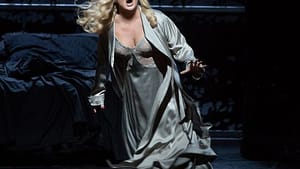Stay in the Loop
BSR publishes on a weekly schedule, with an email newsletter every Wednesday and Thursday morning. There’s no paywall, and subscribing is always free.
Seeing is believing
Netrebko in Verdi’s ‘Macbeth’

You really had to be there. Opera’s most publicized leading lady, Anna Netrebko, scored a triumph with audiences and critics who saw her on stage as Lady Macbeth. But if you listened to the same performance on radio — or closed your eyes during last week’s high-definition telecast — the magic was elusive.
The Russian soprano gained attention as a slender, dark-haired temptress in the 1990s, when she was in her 20s. In recent years she gained weight; her face became rounder and her vocal accomplishments erratic. As Netrebko’s appearance changed, many observers complained about flatness on her top notes and imprecision in her coloratura technique.
For this role, Netrebko has altered her vocal timbre to a darker, smoky tone, stressing what’s dramatic rather than merely pretty. The vocal result with her Lady Macbeth was that her low notes delivered a richer sound than in previous years.
On the other hand, she lacked the fierce, piercing quality that’s essential for Lady Macbeth. The dying-away aspect requested by Verdi for the end of her sleepwalking scene was missing, too. (He specified a high D-flat in a “thread of voice.”) Listening to Netrebko on radio— as I did during two performances before I saw her — slight intonation problems were noticeable.
Sex as a tool
Netrebko’s most resonant tones came in “La luce langue” in Act II, where she sounded appropriately spooky as she contemplated further political murders, and in the banquet scene as she urged her guests to ignore Macbeth’s hallucinations and drink up. There, Netrebko gritted her teeth and spat out her words while trilling impressively. Judged solely by the audio, her Lady Macbeth is a work in progress, occasionally exciting.
Yet the critics who attended the first night were nearly unanimous in proclaiming this work Netrebko’s best ever. The reason for their enthusiasm became clear when the production was telecast in high definition to 2,000 theaters in 67 countries. When you see this dynamo in action, the reservations of recent years are swept away.
Netrebko’s appearance is atypical for Lady Macbeth — more overt than Maria Guleghina in the same production in 2007-08 and than Netrebko herself when she sang the part in Europe. She’s definitely convincing as a bold woman who uses sex as her primary tool for getting what she wants. Netrebko wore a blonde wig and a clinging grey nightgown with a plunging neckline. Her previous weight gain may have detracted from her appeal in adolescent soubrette roles, but here, as a mature woman, her full bosom and revealing costuming added to the characterization.
Netrebko’s acting stressed the woman’s strong control over her husband, specifically through sexual aggressiveness as in the third act "Ora di Morte" (time of death), where she dragged Macbeth onto the floor while calling for "vendetta."
Channeling Hitler
In the title role, the Serbian baritone Željko Lučić sang better than in his 2007 Met debut, with a haunting aria just before he goes to certain death in battle. Bass René Pape and tenor Joseph Calleja added luster to the production in frustratingly small roles. Conductor Fabio Luisi led a brisk reading of the score. Donald Palumbo’s chorus was magnificent in the chilling lament of oppressed refugees as well as in rousing celebration of Macbeth’s death.
Adrian Noble’s production is set in a nondescript modern era. Men wear trench coats and carry semiautomatic weapons, and the witches resemble bag ladies from the ’50s. Yet we’re frustrated if we try to incorporate Netrebko’s characterization into Noble’s concept. Are they suggesting that Hitler and Stalin were spurred to their actions by aggressive women? Was a femme fatale the dagger that appeared before them? I doubt it.
What, When, Where
Macbeth. Opera by Giuseppe Verdi; Fabio Luisi, conductor. Metropolitan Opera production broadcast live in HD in cinemas October 15, 2014; radio broadcast February 7, 2015 at 1pm. www.metopera.org.
Sign up for our newsletter
All of the week's new articles, all in one place. Sign up for the free weekly BSR newsletters, and don't miss a conversation.

 Steve Cohen
Steve Cohen